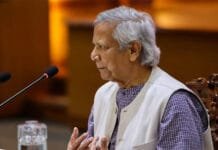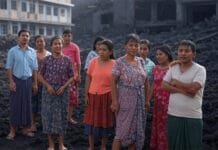Bangladesh is currently grappling with an overwhelming crisis involving more than 1.2 million Rohingya Muslims who have fled from Myanmar. The Rohingya refugee situation has evolved into a significant humanitarian, social, and economic challenge for the country. In recent times, the leadership in Bangladesh, including interim government head Mohammad Yunus, has voiced concerns about the detrimental impact of this ongoing crisis. Yunus has emphasized that while Bangladesh has displayed incredible sympathy and humanitarian aid in hosting the Rohingyas, it has now reached a breaking point. The high costs, both economically and environmentally, are jeopardizing Bangladesh’s own development.
Bangladesh’s Capacity Strained by Rohingya Crisis
For years, Bangladesh has opened its borders to the Rohingya refugees, providing them with shelter in densely populated camps in Cox’s Bazar and other regions. While this was initially seen as a temporary measure, the protracted nature of the crisis, with no viable solutions for repatriation in sight, has burdened Bangladesh. The country is one of the most densely populated nations in the world, and absorbing over 1.2 million additional people has had profound consequences on its resources.
The refugees are mostly concentrated in Cox’s Bazar, now the largest refugee settlement globally. This has led to severe environmental degradation, with forests being cleared to make room for makeshift shelters. The overcrowding has put immense pressure on Bangladesh’s infrastructure, healthcare, and education systems, pushing the country to its limits.
The Economic and Environmental Toll
Bangladesh has spent millions in providing basic necessities such as food, water, and healthcare to the Rohingyas. These expenditures have created a significant strain on the country’s social services. In addition to financial pressure, the environmental consequences have been severe. Deforestation and loss of biodiversity are major concerns, particularly in areas surrounding the refugee camps.
Bangladesh’s economy has suffered, as funds that could have been allocated for national development are now redirected to sustain the refugee population. According to Yunus, Bangladesh’s development is “at stake,” with long-term implications for its growth if the Rohingya crisis continues unresolved.
Calls for Repatriation: Yunus Advocates for Solutions
At a recent meeting held on the sidelines of the United Nations General Assembly (UNGA) in New York, Mohammad Yunus, representing Bangladesh’s interim government, made a strong case for repatriation. Yunus proposed that returning the Rohingyas to Myanmar is the only sustainable solution.
“We have reached our limit,” he stated, underscoring that Bangladesh cannot continue to bear the burden indefinitely. Yunus called for the international community to ensure that Myanmar creates an environment where Rohingyas can return with dignity and safety. Although numerous resolutions, including those from the UNGA, have stressed the need for conducive conditions in Myanmar, no Rohingya has returned to their homeland in the last seven years.
The Root of the Crisis in Myanmar
The Rohingya have faced persecution in Myanmar for decades. Denied citizenship and subjected to systemic violence, they fled in large numbers during the 2017 military crackdown, which many observers, including the United Nations, have called a campaign of ethnic cleansing. Despite international outrage, the situation in Myanmar has remained largely unchanged. The military regime continues to dominate the political landscape, and there has been little progress toward achieving peace and stability.
The lack of dialogue on the core issues plaguing Myanmar has frustrated Bangladesh and other regional actors. Without a meaningful commitment from Myanmar’s authorities to resolve the crisis, the possibility of safe repatriation seems increasingly remote.
Security and Crime in the Refugee Camps
The situation in the refugee camps has become increasingly volatile. The security situation has deteriorated, as Yunus pointed out in his address to global leaders. Criminal networks have infiltrated the camps, leading to heightened risks of drug trafficking, human trafficking, and other illegal activities. Violence within the camps has also escalated, and the lack of adequate security measures has left many refugees, particularly women and children, vulnerable to exploitation.
The large population of young Rohingyas residing in the camps further exacerbates the situation. With few opportunities for education or employment, this youth bulge presents a potential risk for radicalization or involvement in criminal activities. Without a resolution to the crisis, the security concerns in and around the camps could grow even more severe, creating instability not only in Bangladesh but across the region.
Humanitarian Assistance Weakening: A Global Concern
International humanitarian aid for the Rohingya crisis has also started to wane. While Bangladesh has been a generous host, the ongoing support from global partners is essential. However, Yunus warned that the focus on humanitarian assistance is weakening. The prolonged nature of the crisis, coupled with competing global crises, has shifted attention away from the Rohingyas.
This reduction in aid has serious consequences for the well-being of the refugees. Many of them already live in dire conditions, and further cuts in assistance could lead to a humanitarian catastrophe. Essential services like healthcare, education, and food distribution are at risk, leaving the Rohingyas even more vulnerable.
The Need for International Cooperation
Bangladesh has made it clear that it cannot solve this crisis alone. Yunus urged the international community to take decisive action to address the root causes of the Rohingya issue. The responsibility, he stated, lies not just with Myanmar but with global actors who can apply diplomatic and economic pressure to bring about meaningful change.
Bangladesh is calling for international mediation to ensure the safe return of the Rohingyas and to create a peaceful and stable environment in Myanmar. Without this, the prospects for repatriation remain dim, and Bangladesh’s ability to continue supporting the Rohingyas will be severely constrained.
Conclusion: Repatriation as the Only Viable Solution
Bangladesh has shown immense humanitarian spirit in hosting the Rohingyas for years, but the situation is no longer sustainable. The country’s social, economic, and environmental stability is now at risk, and there is no long-term solution in sight. Yunus’s call for repatriation reflects the urgent need for international intervention to ensure that the Rohingyas can return to Myanmar in safety and dignity.
Without concerted efforts to address the underlying causes of the Rohingya crisis, the situation will continue to worsen. The Rohingyas, their host communities, and the global partners involved in humanitarian assistance are all facing growing uncertainties. It is time for the international community to step up and work together to resolve this complex and deeply troubling issue.
















